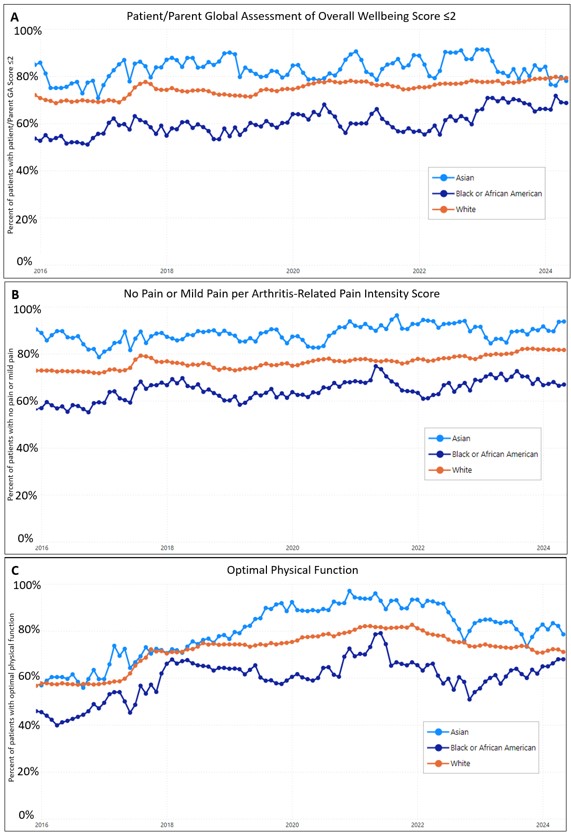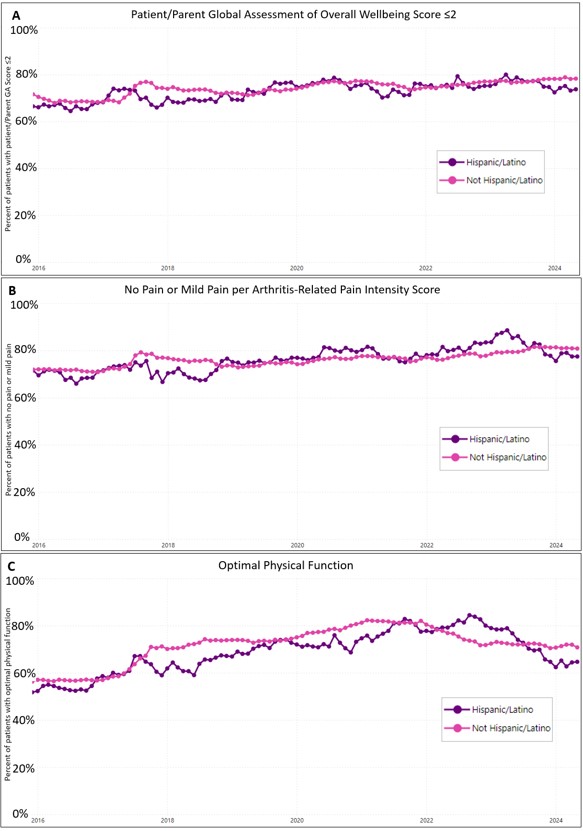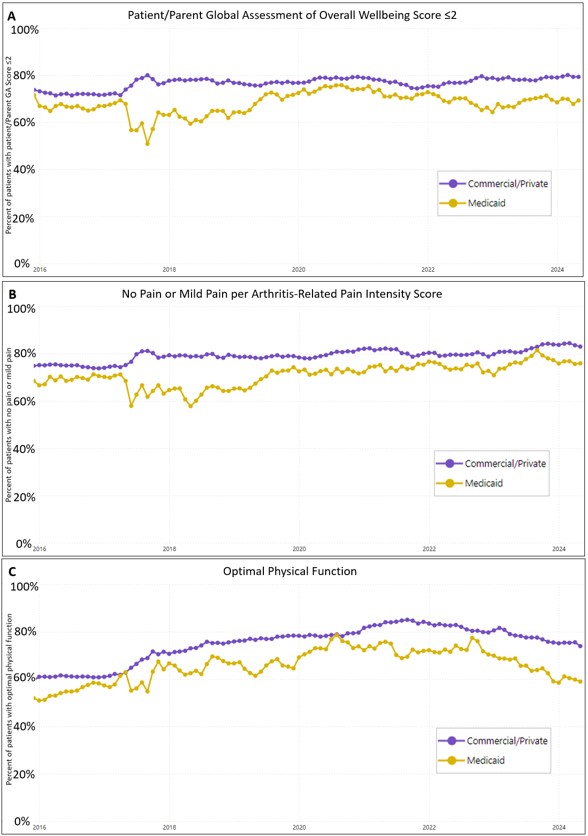Session Information
Session Type: Poster Session B
Session Time: 10:30AM-12:30PM
Background/Purpose: As healthcare moves towards more patient-centered care, it is increasingly important to integrate patients’ opinions into clinical assessments and decision-making. The Pediatric Rheumatology Care and Outcomes Improvement Network (PR-COIN) is a learning health network dedicated to improving healthcare delivery and patient outcomes in juvenile idiopathic arthritis (JIA) through quality improvement methodology. PR-COIN focuses on outcome improvements by measuring disease control, relief of pain, and optimization of physical function through a ‘treat to target’ strategy. These health domains were prioritized by patients and are therefore collected as quality measures in PR-COIN. Our project stratified patient-reported outcomes including the percent of patients with JIA in the PR-COIN registry who had a low patient/parent global assessment of wellbeing score (PtGA), no or mild pain, and optimal physical function by race, ethnicity, and insurance type.
Methods: We assessed PR-COIN network-level data over time from January 2016 to May 2024 on run charts and calculated the mean performance on the patient-reported outcomes during this time frame. A low PtGA value indicates a score of ≤2. No or mild pain equates to a score of ≤3 on the arthritis-related pain intensity scale. Optimal physical function is measured as a score of 0 on the Childhood Health Assessment Questionnaire or score of 40 or higher on PROMIS Mobility or Upper Extremity Function. Race categories examined in this analysis include White, Black or African American, and Asian; other categories were excluded due to small sample size. Ethnicity is reported as Hispanic or non-Hispanic. We assessed two different types of insurance coverage: Medicaid and commercial.
Results: A lower percentage of Black or African American patients with JIA had PtGA scores ≤2 (60.3%), mild or no pain (64.7%), and optimal physical function (60%) compared to White patients (74.8%, 76.5%, 72.2%) (Figure 1). There has not been an apparent difference in outcomes over time between Hispanic and non-Hispanic patients with JIA on these same measures (Figure 2). Fewer patients with JIA on Medicaid had low PtGA scores (68.1%), low pain scores (71%), and optimal physical function (65.9%) compared to patients with commercial insurance (76.7%, 79.3%, 75%) (Figure 3).
Conclusion: We found disparities in patient-reported outcomes in our JIA cohort in the PR-COIN registry according to race and insurance type. In particular, Black or African American patients had worse PtGA scores, pain scores, and physical function compared to patients of White or Asian race, and a similar pattern was found between patients with Medicaid compared to patients with commercial insurance. PR-COIN will monitor the impact of quality improvement interventions to optimize care for patients with JIA by stratifying data by race, ethnicity, and insurance in an attempt to reduce inequities in patient outcomes and monitor for inadvertent exacerbation of these findings.
To cite this abstract in AMA style:
Harris J, Pan N, Bingham C, Vora S, Yildirim-Toruner C, Ferraro K, Friedrichsen E, Batthish M, Burnham J, Fair D, Ganguli S, Gilbert M, Gottlieb B, Halyabar O, Hazen M, Lee T, Lovell D, Mannion M, Oberle E, Ray L, Shishov M, Toth M, Morgan E. Assessment of Patient-Reported Outcomes in Juvenile Idiopathic Arthritis by Race, Ethnicity, and Insurance Type in the Pediatric Rheumatology Care and Outcomes Improvement Network Registry [abstract]. Arthritis Rheumatol. 2024; 76 (suppl 9). https://acrabstracts.org/abstract/assessment-of-patient-reported-outcomes-in-juvenile-idiopathic-arthritis-by-race-ethnicity-and-insurance-type-in-the-pediatric-rheumatology-care-and-outcomes-improvement-network-registry/. Accessed .« Back to ACR Convergence 2024
ACR Meeting Abstracts - https://acrabstracts.org/abstract/assessment-of-patient-reported-outcomes-in-juvenile-idiopathic-arthritis-by-race-ethnicity-and-insurance-type-in-the-pediatric-rheumatology-care-and-outcomes-improvement-network-registry/



